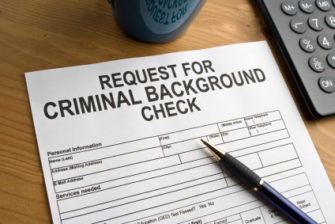- Free Consultation: (631) 352-0050 Tap Here to Call Us
Criminal Conviction Discrimination Case

The New York State Human Rights Law and New York Corrections Law prohibit employers from discriminating against employees on the basis of the employee’s prior criminal conviction status. In August 2016, New York’s federal appellate court was faced with three questions arising from a criminal conviction discrimination case. The federal court asked New York’s highest court for help in deciding the issues. On May 4, 2017, New York’s Court of Appeals issued a decision discussing who can be liable for criminal conviction discrimination in New York.
The facts below are taken from the cases Griffin v. Sirva, Inc. decided by the Second Circuit Court of Appeals and the New York Court of Appeals.
Griffin v. Sirva
The employees in Griffin worked for Astro Moving and Storage, which provided moving and storage services for Allied Van Lines. Allied is essentially owned by various “Sirva Companies.” Allied required Astro to perform criminal background checks for all of its employees which would perform work for Allied. Employees with “serious criminal convictions” were prohibited from working on Allied jobs.
The Griffin employees consented to background checks which revealed that the employees were convicted of felony sexual offenses. Astro then terminated the Griffin employees who sued Astro, Allied, and Sirva.
Criminal Conviction Discrimination Law in New York
New York law prohibits public and private employers from denying employment to any individual who has been previously convicted of a criminal offense. The law makes two exceptions: (1) where the crime has a direct relationship to the employment, or (2) where the employment would create an unreasonable risk to safety or property. If an employer relies on the “unreasonable risk” exception, it must consider eight factors established by the Corrections Law. Failing to do so constitutes a violation of the Corrections Law.
In Griffin, the court was confronted with the question of whether Allied and Sirva could be liable, since the employees did not work directly for them. The Second Circuit decided it could not decide the issue because the New York law was unsettled. So, it certified three questions to the New York Court of Appeals:
- Does the New York State Human Rights law limit liability to the “aggrieved person’s employer?”
- If so, what constitutes an employer?
- Can out-of-state corporations be liable for “aiding and abetting” criminal conviction discrimination within New York?
New York Court of Appeals Decides
On the first question, the Court of Appeals reviewed the two applicable statutes: The Human Rights Law and the Correction Law. The court found significant language in the Correction Law which prohibits conduct of “public or private employers,” noting the language targets employers. The statute’s language also states that liability arises when an application is made “at” an employer. The court concluded that the employment must relate to a specific employer. Taken all together, the Court of Appeals decided that criminal conviction discrimination applies only to an individual’s employer.
Next, the Court of Appeals had to decide what constitutes an employer, specifically, whether the agency relationship in Griffin constituted an employer. For this question, the Court of Appeals decided that the common law definition of employer applies. The Court noted four factors: (1) selection of the servant; (2) payment of salary; (3) power to terminate; and (4) level of control over the servant. Court further noted that “right of control” is the essential factor.
Finally, the Court had to decide whether an out-of-state corporation which is not an “employer” under the law can be liable for criminal conviction discrimination for aiding and abetting discrimination. Here, the Court decided that the Human Rights Law applies to out-of-state defendants because so that New York residents are protected from discrimination within the State. The Court of Appeals easily held that out-of-state corporations may be liable as aiders and abettors because it applies to all “persons” and is not limited to employers.
Criminal Conviction Discrimination Lawyers on Long Island
Famighetti & Weinick PLLC are attorneys on Long Island who handle cases of criminal conviction discrimination in New York. If you have questions about criminal conviction discrimination, the Griffin decision, or the New York Human Rights Law, call 631-352-0050 to speak a Long Island employment lawyer or visit our website at https://www.linycemploymentlaw.com.








